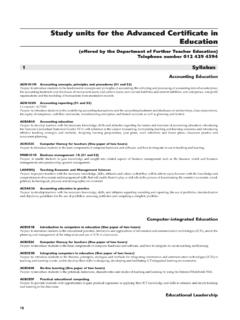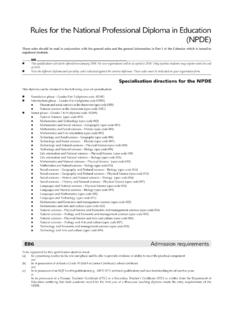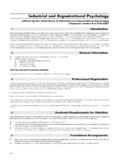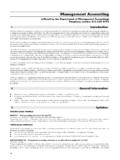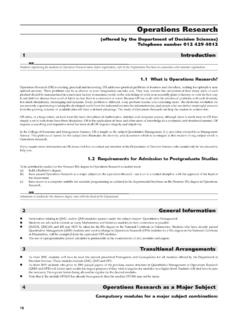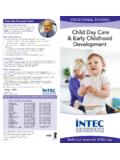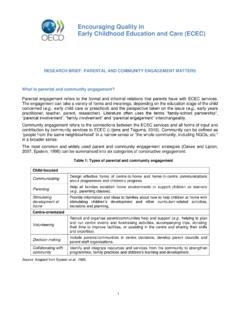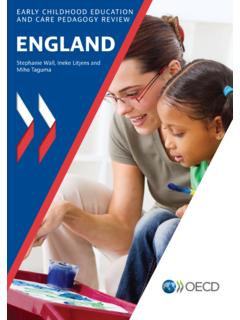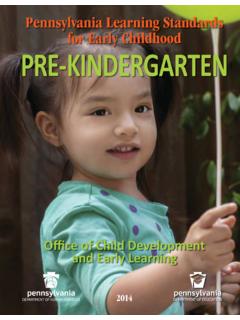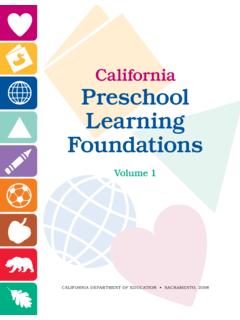Transcription of Study units for BEd (Early Childhood Development ...
1 12 Study units for BEd ( early Childhood Development : foundation phase )(offered by the Department of Teacher education )Telephone number 012 429 45831 General InformationCredit for a degree will be granted for either: SLB201 or MSK201 or SLS2012 Transitional ArrangementsModule failedMust register forPRS3019 HEC101 VETH304U EDA3058 EDT301 NETH306 WEDT302 PEDC10153 SyllabusEducational ThemesFIRST-LEVEL MODULESEDT101G Child Development *Purpose: to gain insight into the Development of the child from birth to age nine years; modalities of Development ; the young child s language and speech Development ; creating an optimal environment for child Development ; relationships and Guidance, counselling and life skills developmentPurpose: to gain insight into theoretical aspects; guidance and life skills issues such as: skills Development , family and sexuality education , education and training, work and employment, economic education , citizenship education ; planning and presenting life skills lessons; observation of pupils; counselling pupils and MODULESEDT201K The young child and learning*Purpose: to gain insight into the defi ning of concepts; the essential moments of childlike learning.
2 The types of learning, and the realisation of learning with regard to the young Environmental educationPurpose: to gain insight into environmental education , teaching and learning in environmental education ; introduction to basic ecological principles and cross-curricular environmental themes and Inclusive education APurpose: to gain insight into the Inclusive education policy on learners who experience barriers to learning and Development (learners with special needs); the nature of the barriers to learning and Development ; early identifi cation and continuous assessment; centre-of-learning-based learning support and the education network of support on the diff erent MODULESETH306W Inclusive education BPurpose: to gain insight into learner support to learners who experience barriers to learning.
3 Students should be able to assess and support learners who experience various impairments, learning diffi culties, emotional and behavioural problems in inclusive education sett Theoretical frameworks in education *Purpose: to expose students to a pluralistic problem-centred approach to educational discourse and to encourage them to interact critically with contemporary issues in Religious education *Purpose: to gain insight into defi ning concepts, points of departure, overview of the fi eld; Study of African Traditional Religion; Study of the following world religions: Hinduism, Buddhism, Judaism, Christianity and Islam; Study of contemporary religious movements, and Study of selected religious Social education *Purpose: to gain insight into the theoretical founding of social education ; the socialising of the young child; family infl uence on the socialising of the young child; gender role identifi cation in the young child; urbanisation and the informal housing sector; the environmentally deprived young child, and child Management of early Childhood Development institutions*Purpose: to gain insight into the South African educational structure.
4 Overview of legislation applicable to early Childhood Development management; policy and provision issues in early Childhood Development ; early Childhood Development centre and school governance; institutional management; critical issues in early Childhood Development StudiesFIRST-LEVEL MODULESPRS101Y early Childhood teachingPurpose: to gain insight into the aims of early Childhood education ; the informal teaching approach in early Childhood education ; the daily programme of an early Childhood centre; play opportunities in an early Childhood centre; choosing and planning content in an early Childhood centre; introduction to evaluation in early Childhood Health in early Childhood education A*Purpose: to gain insight into the clarifi cation of concepts; the importance of health in early Childhood education ; health and the early Childhood environment; health-related Art and handwork*Purpose: to gain insight into the orientation; stages of Development ; aims and objectives; the role of the art teacher.
5 Art activities and Teaching practice 1 (5 weeks)*Co-requisite: PRS101, 102, 103 Purpose: to enable students to carry out practical applications of the teaching principles, theories and concepts they have acquired in other courses through the completion of an observation workbook during an observation period of one week in an early Childhood of various workbooks during a four-week period in an early Childhood note that the Teaching practice (5 weeks) and the organisation thereof is the responsibility of the MODULESPRS2015 Music and movement activities*Co-requisite: Professional Studies IPurpose: to gain insight into the value of music in the child s total Development ; the music curriculum; planning and evaluating music lessons; movement education : its nature and place; planning, presentation and evaluating movement activities: equipment and apparatus for movement Children s literature*Co-requisite: Professional Studies IPurpose: to gain insight into language activities; literature for young children; criteria for selecting literature for young children; presenting stories to young children: suitable The reception year*Co-requisite: Professional Studies IPurpose: to gain insight into curriculum planning.
6 Introduction to reading, writing, spelling, mathematics, general science; nonvernacular Teaching practice 2 (5 weeks)Co-requisite: PRS101 104 and PRS201, 202, 203 Purpose: to enable students to carry out practical applications of the teaching principles, theories and concepts they have acquired in other courses through the completion of various workbooks during a period of three weeks in an early Childhood completion of a workbook during a two-week period in a reception class or the senior group in an early Childhood note that the Teaching practice (5 weeks) and the organisation thereof is the responsibility of the MODULESHEC101V Health education *Co-requisite: Professional Studies IIPurpose.
7 To gain insight into theoretical orientation: health and health education ; personal health; special health issues; fi rst aid and emergency care: environmental health and safety Reading, writing and spelling First language*Co-requisite: Professional Studies IIPurpose: to gain insight into reading and its role in the acquisition of language; approaches to teaching reading; conditions for acquiring language and the ability to read; possible problems in reading; writing and writing skills; spelling and spelling Reading, writing and spelling Second languageCo-requisite: Professional Studies IIPurpose: to gain insight into reading and its role in the acquisition of language; approaches to teaching reading; conditions for acquiring language and the ability to read; possible problems in reading; writing and writing skills.
8 Spelling and spelling Teaching practice 3 (5 weeks)Co-requisite: PRS201 204 and HEC101, PRS302, 303 Purpose: to enable students to carry out practical applications of the teaching principles, theories and concepts they have acquired in other courses through the completion of an observation workbook during an observation period of one week in a Grade 1/Class 1/Sub-standard 1 class. The aim is to orientate students in the more formal approach of foundation phase teaching and to compare the teaching methods of early Childhood education and foundation phase of various workbooks on presenting lessons during a four-week practical teaching note that the Teaching practice (5 weeks) and the organisation thereof is the responsibility of the MODULESPRS401C Mathematics teaching*Co-requisite: Professional Studies IIIP urpose: to gain insight into foundational perspectives; number sense, number concept and number Development .
9 Spatial orientation and spatial Science and technology*Co-requisite: Professional Studies IIIP urpose: to equip students with knowledge, skills and abilities to satisfy their own questions about the workings of the physical and biological world in order to provide learners with the appropriate skills, knowledge and att itudes for understanding the principles and processes of the natural further purpose of this module is to provide students with knowledge, skills and resources of the technical world, to acquire the ability to solve technological problems and perform eff ectively in their changing Teaching practice 4 (5 or 6 weeks)Co-requisite: Professional Studies III and EDT305, PRS401, 402 Purpose.
10 To enable students to carry out practical applications of the teaching principles, theories and concepts they have acquired in other courses through the completion of various workbooks during a period of four weeks in the foundation phase . The student must take control of the class (under supervision) and plan, present and evaluate all teaching activities during this period. All activities presented during the teaching practice periods must comply with the principles of anti-bias, multi-cultural and inclusive note that the Teaching practice (5 weeks) and the organisation thereof is the responsibility of the modulesFDEME3L Computer integration in the classroom (One paper of two hours)Purpose: to train student teachers how to combine appropriate information and communication technologies with teaching and learning strategies and intregrate it to teaching and learning activities in the classroom.
